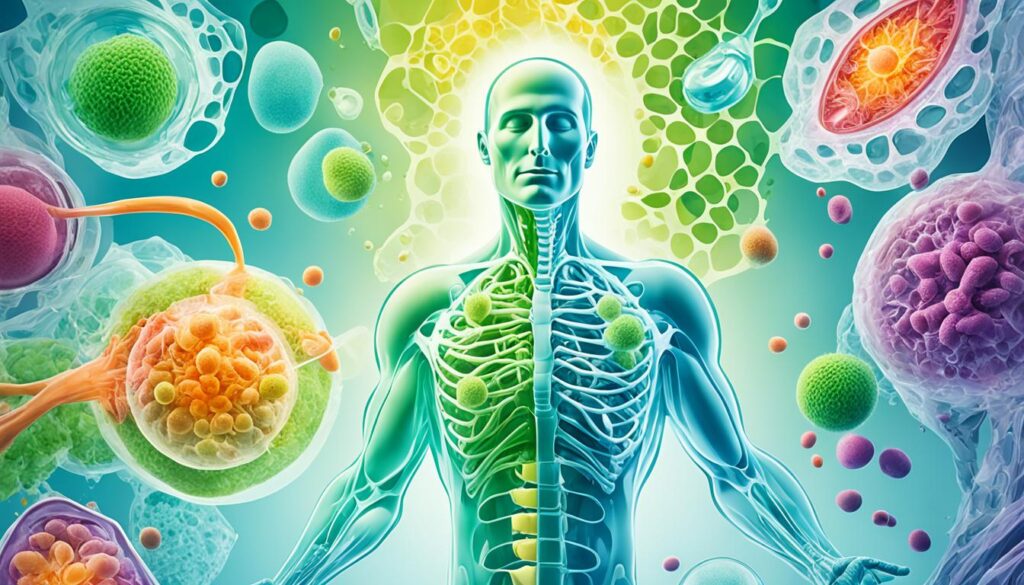Water fasting has gained popularity as a method for weight loss and detoxification, but many people are concerned about its potential impact on growth and development. Is there a risk that water fasting could stunt growth? Let’s explore the effects of water fasting on growth and the consequences of fasting on development.
While some studies suggest that short-term water fasting can have health benefits, including stimulating cell regeneration and enhancing human growth hormone production, it is essential to be aware of the risks and side effects associated with fasting. Understanding these risks is crucial, especially when it comes to growth and development concerns.
Key Takeaways:
- Water fasting may have potential health benefits, including stimulating cell regeneration and enhancing human growth hormone production.
- There are risks and side effects associated with water fasting, which should be carefully considered.
- Proper guidance and supervision are important before embarking on a water fasting journey.
- Individuals should consult with a healthcare professional to assess their own health status before attempting any form of fasting.
- Prioritizing overall health and well-being is crucial, and fasting should be approached in a safe and responsible manner.
Benefits of Water Fasting
Water fasting has gained popularity due to its potential health benefits. Research suggests that this fasting practice can have positive effects on various aspects of health, including:
- Stimulating Cell Regeneration: Water fasting may activate a process known as autophagy, where cells remove and recycle damaged components, promoting cellular rejuvenation and overall health.
- Enhancing Human Growth Hormone Production: Studies have shown that water fasting can increase the production of human growth hormone (HGH), which plays a crucial role in body composition, metabolism, and muscle growth.
- Regulating Blood Sugar and Insulin Levels: Fasting can help lower blood sugar and insulin levels, potentially benefiting individuals with insulin resistance or type 2 diabetes.
- Reducing Inflammation and Oxidative Stress: Water fasting has been associated with a decrease in markers of inflammation and oxidative stress, which are linked to chronic diseases, such as heart disease and cancer.
- Facilitating Weight Loss: By restricting calorie intake, water fasting can lead to weight loss. It promotes the breakdown of stored fat for energy and can help jumpstart a healthier lifestyle.
- Potential Longevity Benefits: Some studies in animals have shown that intermittent fasting, including water fasting, may increase lifespan. However, more research is needed to fully understand the effects on human longevity.
Water fasting can stimulate cell regeneration, enhance human growth hormone production, regulate blood sugar and insulin levels, reduce inflammation and oxidative stress, facilitate weight loss, and potentially promote longevity.
It is important to note that while water fasting may offer these potential benefits, it is not suitable for everyone. Consulting with a healthcare professional before embarking on a water fasting journey is advised, especially for individuals with pre-existing health conditions or those who are pregnant or breastfeeding.
The Role of Autophagy in Water Fasting
Autophagy is a cellular process that plays a crucial role in maintaining overall health and well-being. During water fasting, when the body is deprived of food, the process of autophagy becomes more pronounced. It involves the removal and recycling of damaged proteins and cellular components, allowing cells to regenerate and function optimally.
| Benefits of Autophagy During Water Fasting | Explanation |
|---|---|
| Cellular rejuvenation | Autophagy helps remove damaged components within cells, promoting their renewal and overall cellular health. |
| Improved cellular function | By clearing out damaged proteins and organelles, autophagy enables cells to function optimally. |
| Enhanced stress resistance | Autophagy helps cells adapt to and cope with stressors, leading to improved resilience and longevity. |
| Potential cancer prevention | Autophagy may help eliminate precancerous cells and prevent the development of certain types of cancer. |

Further research is needed to fully understand the relationship between autophagy and the health benefits of water fasting. However, the potential role of autophagy in promoting cellular health and longevity is an intriguing area of study.
Stages of Water Fasting
Water fasting involves several stages that should be followed to ensure safety and effectiveness. By understanding and adhering to proper guidelines, individuals can experience the benefits of water fasting in a responsible manner.
Preparation for Water Fasting
Prior to embarking on a water fast, it is crucial to prepare your body. This involves gradually reducing portion sizes and fasting for part of the day, allowing your body to adjust to periods of restricted food intake. Additionally, transitioning to a plant-based whole-food diet can help cleanse your system and optimize your body’s readiness for fasting.
During the Fast
Once you begin your water fast, it is important to prioritize hydration and electrolyte replenishment. Drinking ample amounts of water throughout the day will help flush toxins from your body and maintain hydration levels. Additionally, incorporating electrolyte-rich beverages or supplements can help prevent imbalances and support your overall well-being.
It is natural to experience fluctuations in mood and energy levels during the fast. It is essential to listen to your body and rest when needed. Hunger pangs may also arise, but they are temporary and can be managed by focusing on the positive effects of fasting on your health and well-being.
Breaking the Fast
When it comes time to break your fast, it is crucial to do so gradually and with intention. Introducing foods back into your diet too quickly or in large quantities can cause digestive distress. Instead, start with small portions of easily digestible foods, such as fruits and vegetables. Gradually increase the complexity of your meals over a few days, allowing your body to readjust to the process of digestion.
| Stages of Water Fasting | Safety Guidelines |
|---|---|
| Preparation for water fasting | – Gradually reduce portion sizes – Fast for part of the day – Transition to a plant-based whole-food diet |
| During the fast | – Stay hydrated and replenish electrolytes – Drink plenty of water throughout the day – Rest when needed – Manage hunger pangs with positive mindset |
| Breaking the fast | – Gradually reintroduce foods in small portions – Start with easily digestible foods – Increase complexity of meals over a few days |
Potential Risks and Side Effects
While water fasting may have potential health benefits, it is important to understand the risks and side effects associated with this practice. Before embarking on a water fast, it is crucial to consider these factors carefully to ensure your well-being and safety.
- Muscle Loss During Water Fasting: One of the potential dangers of water fasting is the loss of muscle mass. When the body is deprived of nutrients, it may turn to muscle tissue for energy, leading to muscle wasting.
- Hunger and Cravings During Water Fasting: Fasting can trigger intense feelings of hunger and cravings, making it challenging to stick to a fast for an extended period. These sensations can be overwhelming and may lead to overeating once the fast is broken.
- Low Energy and Impaired Cognitive Function: Restricting calorie intake during a water fast can result in low energy levels and difficulties with focus and concentration. This can impact daily activities and mental performance.
- Nutritional Deficiencies: Water fasting can pose the risk of nutrient deficiencies since no food intake occurs. This can lead to imbalances in essential vitamins, minerals, and other nutrients necessary for overall health.
- Eating Disorders and Water Fasting: Those with a history of or propensity for eating disorders may be at a higher risk of developing disordered eating patterns or exacerbating existing conditions while practicing water fasting. It is important to approach fasting with caution in these cases.
- Ketoacidosis and Water Fasting: While rare, a potentially life-threatening condition called ketoacidosis can occur during prolonged water fasting. Ketoacidosis is characterized by the build-up of ketones in the blood, which can disrupt the body’s acid-base balance and cause severe complications.
Who Should Not Water Fast?
Water fasting is not suitable for everyone. Certain individuals should avoid water fasting altogether due to their specific health conditions and needs. These include:
- Pregnant or breastfeeding women: Fasting can deprive the body of essential nutrients needed for the health of both the mother and the baby.
- Underweight individuals: Water fasting can further compromise the nutritional status of those who are already underweight.
- People with medical conditions: Certain medical conditions, such as diabetes, kidney disease, or liver disease, may be incompatible with water fasting. It is essential to consult with a healthcare professional before beginning any fasting regimen.
It is important to prioritize your well-being and consider any potential risks when deciding whether or not to engage in water fasting. Consulting with a healthcare professional or registered dietitian can provide you with personalized guidance based on your health and individual needs.
| Potential Risks | Who Should Not Water Fast |
|---|---|
| Muscle loss during water fasting | Pregnant or breastfeeding women |
| Hunger and cravings during water fasting | Underweight individuals |
| Low energy and impaired cognitive function | People with medical conditions |
| Nutritional deficiencies | |
| Eating disorders and water fasting | |
| Ketoacidosis and water fasting |
It is essential to make informed decisions regarding water fasting and prioritize your overall health and well-being.

Conclusion
In conclusion, water fasting offers potential health benefits such as stimulating cell regeneration, enhancing human growth hormone production, and promoting weight loss. However, it is crucial to approach water fasting with caution and under proper guidance due to associated risks and side effects.
Before embarking on a water fast, individuals should carefully consider their own health status and consult with a healthcare professional. Prioritizing overall health and well-being is essential, ensuring that any fasting practice is done in a safe and responsible manner.
While water fasting may have its merits, it is vital to remember that individual experiences may vary, and the effects of fasting can differ from person to person. Furthermore, it should not be considered a quick fix for health issues or a sustainable long-term solution. Considerations such as nutritional needs, personal goals, and individual circumstances should be evaluated before undertaking a water fast.
To make an informed decision about water fasting, it is recommended to gather comprehensive information, consult healthcare professionals, and evaluate the potential benefits and risks. With proper understanding and guidance, individuals can undertake water fasting in a manner that aligns with their health goals and overall well-being.




